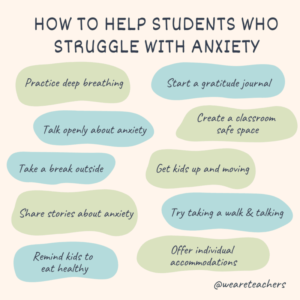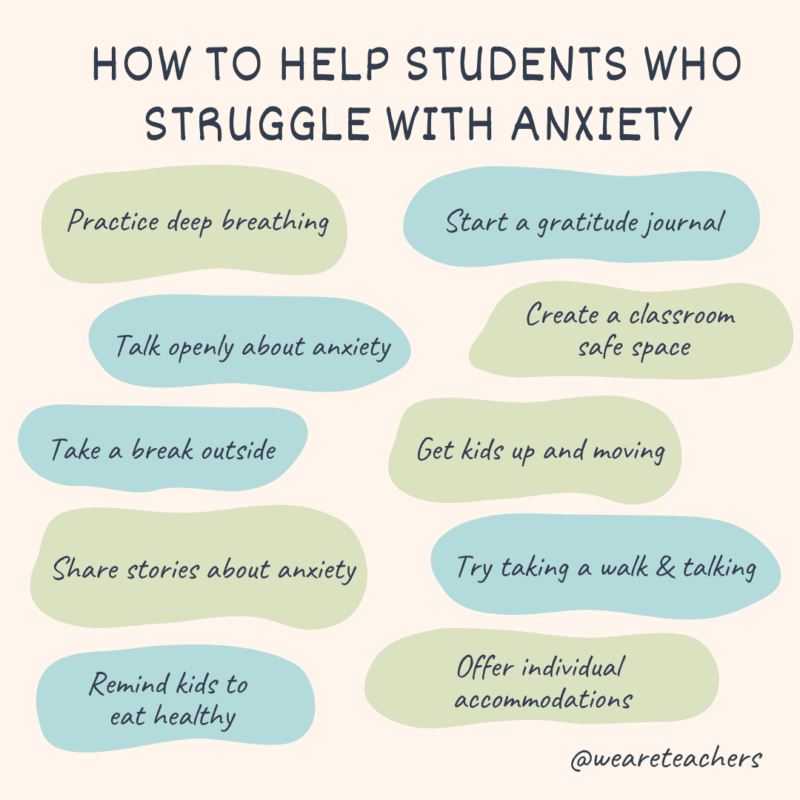
Performance fear not only has an impact on young people's school results, but controls their social life and can cause behavior problems. Teachers should see performance anxiety not as a limitation, but as a chance to equip adolescents with strategies to tackle their fears and face the future optimistically.
However, identifying, understanding and approaching this anxiety still troubles teachers. This article gives more insight into the adolescent with fear of failure and it offers guidelines and structure for teachers.
Recognizing Performance Fear at Secondary School
Pupils with performance anxiety typically have a negative self image and low self-esteem. They are very sensitive for criticism. They don't rate themselves in a positive way and always think others do better. They worry a lot and rather think the worst. Cognitively, they can be very "perfectionistic," hard working and can put themselves under so much pressure to do well that instead they will freeze and their mind goes blank (black out).
Other pupils give the impression they are lazy; they delay their work and use excuses like: "I can't do that anyway." In extreme cases, they might dimiss school altogether and don't want to go anymore. Because of their passive behavior, these pupils are often diagnosed as problem cases with little motivation or limited capacities, while in actual fact they are just trying to avoid problems (bad results, being laughed at, disapproval) and often are very intelligent.
Socially, students with fear of failure are usually very shy, don't ask questions or engage in classroom discussions. They often hide in large groups since they don't like to be at the foreground and stand up for themselves. Friends are often sparse. However, they can also be very extrovert with verbally loud, clownish and sometimes even aggressive behavior. This is only a facade to hide uncertainties. A common misconception is to class and treat this group as having ADHD (behavior disorder).
Teacher Tips for Managing Performance Anxiety at High School
Teachers often struggle with the complexity of this anxiety and without realizing it, they put even more pressure on their students. Here are some strategies on how to build classroom success and eliminate fear and failure.
Give positive feedback: pupils with performance fear are very sensitive to negative remarks. Be very careful how they are addressed. Find a balance between positive and negative things to say when evaluating and always emphasize on the positive.
create positive, intrinsic motivation with students. They have to do a task because they find it interesting, enriching or fascinating and not because they will get a grade for it. Incorporate materials and topics into lessons that appeal to young people.
Increase student motivation:
help students accept that it is OK to fail, also when it concerns tests. Nobody is perfect. Make them realize people can actually learn from the teacher's and their own mistakes.
Make mistakes:
Search together with pupils for the causes of their successes or failures. Emphasize their own share in the achievement. Make them feel they can direct and change their way of thinking, like the ancient Greek philosopher Epictetus (AD 55- AD 135) said: "We are disturbed not by events, but by the views which we take of them." Be open and talk to students. Teachers need to tell students that they definitely don't think they are stupid or less intelligent; that teachers rate them because of who they are and not because of their results.
Student and teacher reflection:
avoid putting students with performance fear in front of the classroom. Give them the opportunity to remain seated when giving answers or speeches or let them come up with an alternative, less threatening, form of presentation.
Ways to give answers and make speeches:
Test results: Give back test results as soon as possible to avoid worrying and negative thoughts. Correct tests together so that destructive thinking patterns can be adjusted.
: Inform students and their parents about expert help (student counselling, talk groups, psychologist). Parents, usually unknowingly, develop or increase their children's performance fear (genetic, relational, pedagogical, socio-economic factors) and they should always be included in the treatment. Only with a strong partnership between student, parents (caretakers) and educators can the anxiety be overcome.
Ways to seek help
An authentic student–teacher relationship based on trust and belief, changed thinking patterns, and a safe learning environment with room for failure and intrinsic motivation (take away the focus on results) are key factors in managing academic anxiety.

